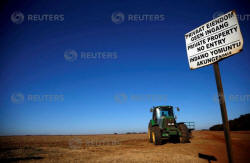|
President Cyril Ramaphosa's party has made the acceleration of
land redistribution a key issue ahead of 2019 elections, while
pledging to carry out land reform in a way that does not
threaten food security.
Most private land remains in the hands of the white minority
more than two decades after the end of apartheid, making it a
vivid symbol of wider disparities.
"If you create uncertainty of some aspects of your environment,
and land tenure is one of them, that is one aspect that
investors will be looking at," Sérgio Pimenta, the vice
president for the Middle East and Africa at the International
Finance Corporation (IFC), the World Bank's private investment
arm, told Reuters.
"What investors are looking for is certainty," he said on the
sidelines of a meeting between the World Bank and member
countries in Livingstone, a town located in Zambia south of the
capital Lusaka.
"The land issue is a complex issue," he said. "Whatever the
solution the government is looking at, creating an environment
that is reliable, that is certain, is important."
Public hearings on land redistribution were held earlier this
year across South Africa, attracting large crowds and often
emotional testimony.
A parliamentary committee will consider that testimony and other
contributions before recommending whether or not to change the
constitution to allow land to be expropriated without
compensation.
Pimenta said South Africa's long-term economic outlook was
positive. The Bank had invested about $2 billion through the IFC
over the last 5-6 years, he said.
Africa's most industrialized economy is struggling with
ballooning debt that risks pushing its sovereign credit ratings
deeper into "junk" territory. Other problems include
cash-strapped state firms and a stubbornly high unemployment
rate.
(Editing by James Macharia and)
[© 2018 Thomson Reuters. All rights
reserved.] Copyright 2018 Reuters. All rights reserved. This material may not be published,
broadcast, rewritten or redistributed.
Thompson Reuters is solely responsible for this content.
 |
|




